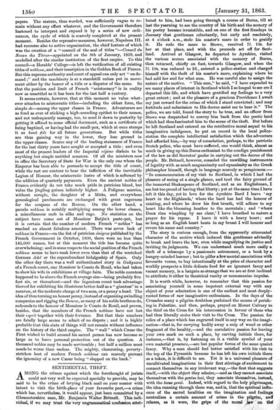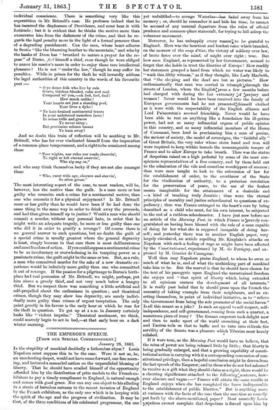SENTIMENTAL THEFT.
AMONG the crimes against which the forethought of jurists could not very well be expected specially to provide, may be said to be the crime of levying black mail on your master with intent to visit the birth-place of your favourite poet,—a crime which has, nevertheless, it would appear, just been committed by a Gloucestershire man, Mr. Benjamin Walter Britnell. This indi- vidual, if we may trust the very ungrammatical confession attri- buted to him, had been going through a course of Burns, till at last the yearning to see the country of his birth and the scenery of his poetry became irresistible, and on one of the first Sundays in January that gentleman reluctantly, but early and resolutely, at 4 o'clock a.m., stole his master's mare in order to gratify it. He rode the mare to Stowe, received 71. 10s. for her at that place, and with the proceeds set off for Scot- land. Arrived at Glasgow, he departed to Ayrshire, visited the various scenes associated with the memory of Burns, then returned, chiefly on foot, towards Glasgow, and when the 71. 10s. was reduced to 2d., entered a police-station and charged himself with the theft of his master's mare, explaining where he had sold her and for what sum. He was careful also to assign the nature of the motive. " This sum," he said, " I have expended to see many places of interest in Scotland which I so longed to see ere I departed this life, and which have gratified my feelings to a very great extent ; and at the pleasure of a gracious Providence I await my just reward for the crime of which I stand convicted ; and may fortitude and submission to His decree assist me to bear it." The police, we are told, found the story to be true, and an officer from Stowe was despatched to convey him back from the poetic land which had thus fascinated him to the scene of the theft. But before he left Scotland and entered on the retributive moral sequel to his imaginative indulgence, he put on record in the local police- station the complete intellectual satisfaction which the adventure had afforded him,—by way of consolation, perhaps, to the patriotic Scotch police, who must have suffered, one would think, almost as much in giving up this Burns enthusiast to the condign punishment of the law as did Socrates' gaoler in carrying out the decree of the people. Mr. Britnell, however, consoled the unwilling instruments of legality with as much magnanimity and equanimity as the Greek philosopher himself, though in language scarcely so perspicuous :— "In commemoration of my visit to Scotland, in which I had the pleasure of seeing at a single glance, and trod the fairy ground of the immortal Shakespeare of Scotland, and as an Englishman, I am but too proud of having that liberty; yet at the same time I have left it this day, yet in love for the Ayrshire Bard I leave my heart in the Highlands,' where the bard has had the honour of existing, and where he drew his first breath, will adhere to my heart like the blooming heather to the mountain ; and where Dooa rins wimpling by sae clear,' I have breathed to nature a prayer for his repose. I leave it with a heavy heart ; and so long as an English heart beats in my breast I will honour and revere his name and country."
The story is curious enough, from the apparently attenuated character of the motive which induced this gentleman advisedly to break and brave the law, even while magnifying its justice and inviting its judgments. We can understand much more easily a theft of a telescope 1..y a passionate astronomer, or a book by a hungry-minded learner ; but to pilfer aiew mental associations with favourite verses, to buy intentionally at-the price of character and worldly prospects a little delicate food for an ignorant fancy and vacant memory, is a bargain so strange that we are at first inclined to attribute it either to theatrical vanity or monomaniac impulse.
It is worth while, however, to remember that this passion for associating yourself in some impotent external way with any object of .your admiration is one of the earliest and most deeply- rooted forms of raw imaginative enthusiasm. In the days of the Crusades many a pilgrim doubtless purloined the means of perish- ing in Palestine, and then, perhaps, prayed on Mount Calvary to the thief on the Cross for his intercession in favour of those who had thus literally stolen their visit to the Cross. The passion for relics of a place which has engraved itself in any way on the imagi- nation—that is, for carrying bodily away a snip of wood or other fragment of the locality,—and the correlative passion for leaving your own mark on such a place, by carving initials there, for instance,—that is, by fastening on it a visible symbol of your own material presence,—are but popular forms of the same quaint fancy. Why a man should feel better satisfied with his visit to the top of the Pyramids because he has left his own initials there as a token, it is difficult to see. Yet it is a universal pleasure of uncultivated imaginations in their first stirrings of excitement to connect themselves in any irrelevant way,—the first that suggests itself,—with the object they admire,—and as they cannot associate themselves with the genius loci, they associate themselves, instead, with the locus genii. Indeed, with regard to the holy pilgrimages, the idea running through them was, and is, that the spiritual influ- ence of the sacred localities on the imagination and feelings neutralizes a certain amount of crime in the pilgrim, and relaxes, as it were, the gripe of the moral jor r o thi
‘. 0 ye donee folk who live by rule Grave, tideless-blooded, calm and cool Compared wi' you,—oh fool, fool, fool !
How much unlike !
Your hearts are just a standing pool, Your lives a dyke !
" No hair-brained sentimental traces In your unlettered nameless faces !
In arioso trills and graces
Ye never stray ;
But gravissimo solemn basses
Ye hum away!
And no doubt this train of reflection will be soothing to Mr. Britnell, who has for ever vindicated himself from the imputation of a common-place temperament, and a light to be numbered among those
"Poor wights, nae rules nor roads observin', To right or left eternal swervin', Who zig-zag on,"
and who may think themselves lucky if they are not also amongst those
Who, curet with ago, obscure and starvin', So aften groan."
The most interesting aspect of the case, to most readers, will be, however, less the motive than the guilt. Is a man more or less guilty who commits such a crime for a sentimental motive, than one who commits it for a physical enjoyment? Is Mr. Britnell more or less guilty than he would have been if he had done the same thing in the same way in order to drink away the proceeds, and had then given himself up to justice ? Would a man who should commit a murder, without any personal hate, in order that he might write an adequate tragedy, be more or less guilty than one who did it in order to gratify a revenge? Of course there is no general answer to such questions, but no doubt the guilt of a special crime is usually greatest where the general depravity is least, simply because in that case there is most deliberateness and most freedom of action. If you could suppose a sentimental crime to be as involuntary or overwhelming in its tempting power, as a passionate crime, the guilt might be the same or less. But, as a rule, a man who committed murder for the sake of a new dramatic ex- perience would be infinitely more guilty than one who committed it out of revenge. If the passion for a pilgrimage to Burns's birth- place had real possession of Mr. Britnell, we might, perhaps, put him above a greedy thief, and not very much below a hungry thief. But we suspect there was something a little artificial and self-propelled about the enthusiasm in question ; and theatrical crimes, though they may show less depravity, are surely indivi- dually more guilty than crimes of urgent temptation. The only point greatly in his favour is the early hour at which he rose for the theft in question. To get up at 4 a.m. in January certainly looks like " violent impulse." Theatrical sentiment, we think, could scarcely begin to act in bed,—at that early hour on a dark winter morning. individual conscience. There is something very like this superstition in Mr. Britnell's case. He professes indeed that he has incurred the displeasure of Providence, and must bear it with fortitude ; but it is evident that he thinks the motive more than exonerates him from the dishonour of the crime, and that he re- gards the legal penalty more in the light of a formal penance than of a degrading punishment. Can the man, whose heart adheres to Scotia " like the blooming heather to the mountain," and who by the banks of Doon has " breathed to nature a prayer for the re- pose" of Burns, feel himself a thief, even though he were obliged to annex his master's mare in order to enjoy those rare intellectual pleasures? He is not " under the law," though he may suffer its penalties. While in prison for the theft he will inwardly address the legal authorities of this country in the words of his favourite poet :—































 Previous page
Previous page